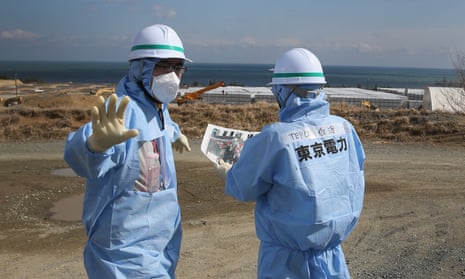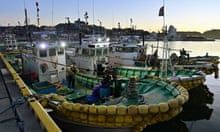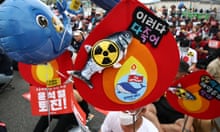Plans by Japan to build dozens of coal-fired power stations will cause at least 10,000 premature deaths, according to a study, as the country struggles to fulfil its climate change obligations five years after the Fukushima disaster closed down almost all of its nuclear plants.
Greenpeace and the environmental group Kiko Network said in a joint report that Japan’s determination to press ahead with a massive expansion in fossil fuel-based power production, with at least 43 plants to be built over the next 12 years, would come at a price to human health and “lock in carbon emissions for decades”.
The warning comes after a meeting of the G7 environment ministers in Toyama at the weekend, at which Japan repeated its pledge to cut carbon emissions by 26% from 2013 levels by 2030 – a target campaigners have derided as woefully inadequate.
“Six large coal-fired power plants are planned within 100km of Tokyo. This massive expansion of coal power generation so close to huge urban areas like Tokyo is simply insane,” said Lauri Myllyvirta, a senior coal campaigner at Greenpeace.
“We could save thousands of lives cut short from air pollution if the government chose to embrace renewable energy over dirty coal. Japan is already considered the worst performer among the G7 when it comes to phasing out coal. If we are to have any chance of limiting average global temperature rise to 1.5 degrees, fossil fuels must be kept in the ground – not pumped into the air over our cities.”
Using atmospheric modelling to gauge the potential effects on public health, the groups projected that between 6,000 and 15,000 people would die prematurely in the Tokyo area over the new plants’ average operating life of 40 years.
Additional plants near the Osaka and Hyogo regions in western Japan would cause 4,000-11,000 premature deaths over a similar period.
Projected particle pollution emissions from the new power plants around Tokyo would be equivalent to that from 13m passenger cars, the report said.
A study published last week by Oxford University’s Smith School of Enterprise and the Environment said Japan risked being saddled with a fleet of worthless coal-fired power stations due to overcapacity and lower energy costs.
The school’s sustainable finance programme said overcapacity, combined with global moves to cut carbon emissions and the shift towards more cost-effective renewables, could leave the country with a stranded investment in coal plants worth $56bn
“The expansion of coal in Japan appears to be predicated on a benign environment for incumbent utilities,” the programme’s director, Ben Caldecott, said.
“The reality is that disruption in the power sector is accelerating. The idea that the power sector will remain relatively static and ‘safe’ for new coal-fired power stations is counter to the evidence we see internationally across the G20.”
The G7 environment ministers’ meeting ended on Monday with a pledge that countries would not wait until the deadline of 2020 – set at last year’s UN climate conference in Paris – to decide how they will achieve their long-term emissions cut of 80% by the middle of the century.
But there are growing doubts that Japan, the only G7 country investing in new coal plants, will even achieve its 2030 target.
In contrast to the US, Britain and other developed nations that are abandoning coal, Japan has turned to fossil fuels to fill the energy gap left by the closure of dozens of nuclear power plants in the wake of the triple meltdown at Fukushima Daiichi in March 2011.
All but two reactors remain offline while they undergo safety checks, while potential reactor restarts have encountered strong opposition from residents concerned about the facilities’ vulnerability to powerful earthquakes, tsunamis and volcanic eruptions.
Japan relied on nuclear for about 30% of its energy needs before Fukushima and, despite the shutdowns, the government says nuclear will generate 20-22% of total electricity by 2030.
Its enthusiasm for coal is at odds with sections of the business community, however. Japanese trading house Mitsui said last week it would trim its thermal coal investments amid growing pressure worldwide for firms to lower their dependence on fossil fuels.
“Considering the result of the global climate summit (in Paris), we basically plan to reduce thermal coal assets,” Mitsui’s chief executive, Tatsuo Yasunaga, told analysts.
Kimiko Hirata, the international director of Kiko Network, said: “Governments that have signed the Paris agreement must now legislate to keep fossil fuels in the ground and strongly support policies which lead to 100% renewable energy.
“Following the Fukushima disaster and subsequent shutdown of its nuclear fleet, Japan has been setting global records for energy consumption reduction, while renewables such as solar, have been booming.
“Japan needs to give renewables priority access to the grid and stop wasting resources trying to restart nuclear plants and expanding dirty coal.”









